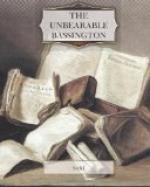“He has also,” said Mrs. Goldbrook, “helped her to make the next biggest mistake of her life—marrying Courtenay Youghal.
CHAPTER XVI
It was late afternoon by the banks of a swiftly rushing river, a river that gave back a haze of heat from its waters as though it were some stagnant steaming lagoon, and yet seemed to be whirling onward with the determination of a living thing, perpetually eager and remorseless, leaping savagely at any obstacle that attempted to stay its course; an unfriendly river, to whose waters you committed yourself at your peril. Under the hot breathless shade of the trees on its shore arose that acrid all-pervading smell that seems to hang everywhere about the tropics, a smell as of some monstrous musty still-room where herbs and spices have been crushed and distilled and stored for hundreds of years, and where the windows have seldom been opened. In the dazzling heat that still held undisputed sway over the scene, insects and birds seemed preposterously alive and active, flitting their gay colours through the sunbeams, and crawling over the baked dust in the full swing and pursuit of their several businesses; the flies engaged in Heaven knows what, and the fly-catchers busy with the flies. Beasts and humans showed no such indifference to the temperature; the sun would have to slant yet further downward before the earth would become a fit arena for their revived activities. In the sheltered basement of a wayside rest-house a gang of native hammock-bearers slept or chattered drowsily through the last hours of the long mid-day halt; wide awake, yet almost motionless in the thrall of a heavy lassitude, their European master sat alone in an upper chamber, staring out through a narrow window-opening at the native village, spreading away in thick clusters of huts girt around with cultivated vegetation. It seemed a vast human ant-hill, which would presently be astir with its teeming human life, as though the Sun God in his last departing stride had roused it with a careless kick. Even as Comus watched he could see the beginnings of the evening’s awakening. Women, squatting in front of their huts, began to pound away at the rice or maize that would form the evening meal, girls were collecting their water pots preparatory to a walk down to the river, and enterprising goats made tentative forays through gaps in the ill-kept fences of neighbouring garden plots; their hurried retreats showed that here at least someone was keeping alert and wakeful vigil. Behind a hut perched on a steep hillside, just opposite to the rest-house, two boys were splitting wood with a certain languid industry; further down the road a group of dogs were leisurely working themselves up to quarrelling pitch. Here and there, bands of evil-looking pigs roamed about, busy with foraging excursions that came unpleasantly athwart the border-line of scavenging. And from the trees that bounded and intersected the village rose the horrible, tireless, spiteful-sounding squawking of the iron-throated crows.




